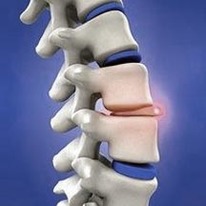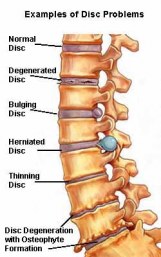
One of the common injuries in serious auto accidents, especially high-speed rear-end accidents is bulging disks in a spine. A bulging disk is a condition related to the spine, usually the lumbar, or lower back, that occurs when a disk bulges through a crevice in the spine. Disks are the soft, gelatinous material that cushions the vertebrae of the spine and allow it to flexibly bend and move. A bulging disk injury occurs when the disk shifts out of its normal place and most often occurs simply as a result of age and the amount of movement over a period of time as well normal wear and tear. A bulging disk is different from a herniated disk in that a bulging disk typically occurs gradually over time rather than suddenly.
In many cases, a bulging disk may be diagnosed as a condition secondary to another problem. Because a bulging disk does not always cause pain, it may only be found during a routine or diagnostic imaging test such as magnetic resonance imaging (MRI). The medical treatment for a bulging disk is relatively conservative in most cases. Rest and lifting restrictions are common, and a doctor may recommend a combination of heat and ice therapy and anti-inflammatory medications or cortisone injections to alleviate the symptoms. Back surgery, though not as common, can relieve severe pain caused by compression on the nerves from a bulging disk that becomes herniated. 
One of the most common injuries suffered in car accidents, and especially in the rear-end accidents is disc herniation and disc bulges. Most injured people who are diagnosed with herniated discs or bulging discs have back pain or neck pain prompting the MRI scan that detects the problem. MRI scan of the back is currently the most commonly performed test to evaluate for herniated discus. MRI scan can distort the degree of herniation or a bulge, but generally provides excellent images of the anatomy of the back and neck. One issue, however, is that MRI scan findings may not correlate well with the patient's pain complaints and may not, for instance, always explain why a bulging/herniated disc in the back area causes pain in the person's leg. The treatment of bulging discus and herniated discs condition is typically a combination of anti-inflammatory medications, physical therapy or exercise, and muscle relaxors. Chiropractic treatment is generally accepted as helpful treatment for low back pain. Alternatively, a patient may be advised to undergo a surgical intervention to remove bulging or herniated discs, if the pain and the overall condition requires such a procedure.
Disc surgery is often successful at reducing pain resulting from having herniated discs. However, studies comparing the effectiveness of surgical v. non-surgical treatment of disc conditions demonstrate mixed results, and surgery should not always be the first option, even though it might be encouraged by a particular doctors, as sometimes the motivations of doctors to perform a surgery are less than noble and are in large part driven by billing your insurance company. This means, that seeking at least one second opinion from another competent and reputable doctor as to the need for surgery is a very good idea. If you plan on having a surgery in a foreseeable future, it's very important that either you or your attorney obtain a letter from a potential surgeon about the cost and the nature of the surgery and the treatment will need during recovery in order to maximize the settlement of your injury claim or a court award, if you case goes to trial. Yesterday, I had lunch with a friend, who has been an orthopedic surgeon for over 20 years. During our conversation, he reminded me of the fact that it's generally a good idea to stay away from chiropractic treatment or any kind of other "passive" back and spine manipulation if a person is diagnosed with disk herniation. This of course makes a lot of sense. If disks are already herniated / displaced, applying more mechanical pressure on them is not likely to further displace them and cause greater pain, but it can cause a substantially greater pain, turning otherwise asymptomatic (pain-free) person to the one suffering greatly from back pain.
So, if you have been diagnosed with disc herniation, consult with your orthopedic surgeon and/or a neurologist before you consider obtaining chiropractic treatment or even physical therapy. For further information on disc and spinal injuries, check out my san francisco accident injury blog. |
Contact us
Contact us for a free, no-obligation consultation to discuss your injury claim at (415) 295-4730 Categories
All
|
 RSS Feed
RSS Feed
